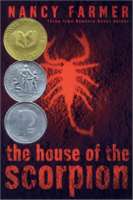Monique Storie, University of Guam, Latte Heights, GU

. . . I unconsciously considered them the literary equivalent of going to an action-packed movie, e.g. lots of action but not much story.
At the same time that Ethan was immersing himself in all things Hunger Games, my husband, who was half a world away, saw firsthand how these same books were creating a whirlwind of excitement among his non-reader friends. Not being able to read the book himself (the libraries and bookstores were all out and we have not progressed to e-readers yet), he watched with fascination as one book created such fervor and caused so many guys to drop their computer games and read. He described it like a wildfire that jumped from one location to another and could not be contained.
When he finally had a chance to read it, Brett was hooked as well. Brett would literally be running behind Ethan, trying to take Ethan’s copy or making predictions hoping Ethan would give some of the plot away. To Brett’s chagrin, Ethan coaxed Brett to rethink what he was reading when his predictions were off. They even shared grand conversations in “boy language” (what we refer to as those idiomatic expressions that guys share among themselves and subjects that are especially interesting to guys that I would just not understand). One notable conversation they had was about President Snow, his motivations and agenda, and their connections to US politics.
While they were engaged in their reading and conversations, Brett remarked to me “WOW! This is what you’re reading? These books are intense. I mean, adult fiction is intense too but this is a different kind of intense.” He was referring to the idea that children’s literature and young adult books address their themes and big ideas straight on rather than shroud them in layers of complexity that he had become accustomed to in adult fiction. He then asked “What else should I read?” I immediately thought about Nancy Farmer’s The House of the Scorpion, Marie Lu’s Legend, and James Dashner’s The Maze Runner. As I continued to mentally scroll through the possibilities, I noticed that I favored works with distopic societies over those with high speed action or any realistic fiction. I figured that I glossed over the realistic fictions because they were just not a good match for Brett’s taste but wondered why I didn’t choose more “adrenaline rush”-type books especially since both Brett and Ethan are gamers and enjoy action-packed shows.
When I attempted to look for other action books to recommend, I found the webpage Through the Eyes of an Author: The Journal of Young-Adult Author Julie Hahnke where she talked about evaluating children’s literature for violence. As I was thinking about her points about the appropriateness of violence in children and adolescent literature, I began to wonder if I was being a “book snob”— that I was not selecting action adventure books because I unconsciously considered them the literary equivalent of going to an action-packed movie, e.g. lots of action but not much story.
I have always considered fantasy (especially dystopian stories) and action adventure stories as equals in the typical guy reader preferences. Dystopian stories encourage readers to ponder what works and what doesn’t in our community’s social structures, appealing to their sense of action (e.g. political order). Action adventure books are fast-paced and “involve danger, risk, and excitement” (“The Adventure Genre”) and shows the resiliency of a person and the hardiness of the human spirit. The characteristics of this genre resemble what many guys today want in their video games: dangerous, risky, exciting, fast-paced, and I’m sure they would argue that resiliency is the respawning or unlimited lives option on the game. It seems to me that action adventure stories might have one step up on fantasy because it mirrors the way many guys view entertainment, making it chockfull of potential connections. With that said, I wonder “why aren’t adventure stories at the top of my reading list?”… I might do a better job in learning “boy language” if I started reading more action adventure books (especially since we’ve decided video games and I do not mix).
References
Collins, Suzanne. The Hunger Games. New York: Scholastic, 2009.
Dashner, James. The Maze Runner. New York: Delacorte Books, 2010.
Farmer, Nancy. The House of the Scorpion, New York: Atheneum, 2004.
Lu, Marie. Legend. New York: Putnam, 2011.
Journey through Worlds of Words during our open reading hours: Monday-Friday, 9 a.m. to 5 p.m. and Saturday, 9 a.m. to 1 p.m. To view our complete offerings of WOW Currents, please visit archival stream.
- Themes: Monique Storie
- Descriptors: Debates & Trends, WOW Currents
